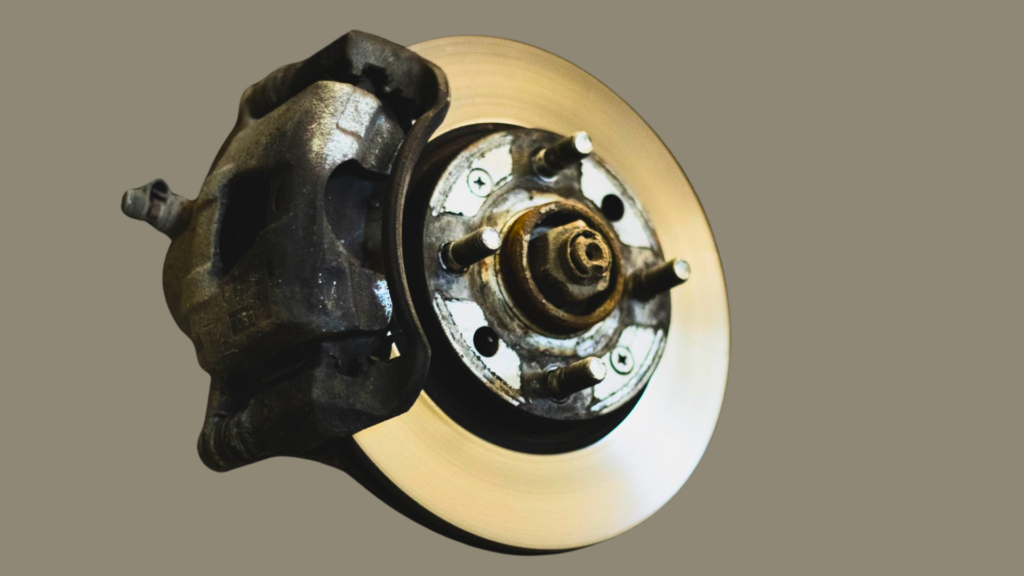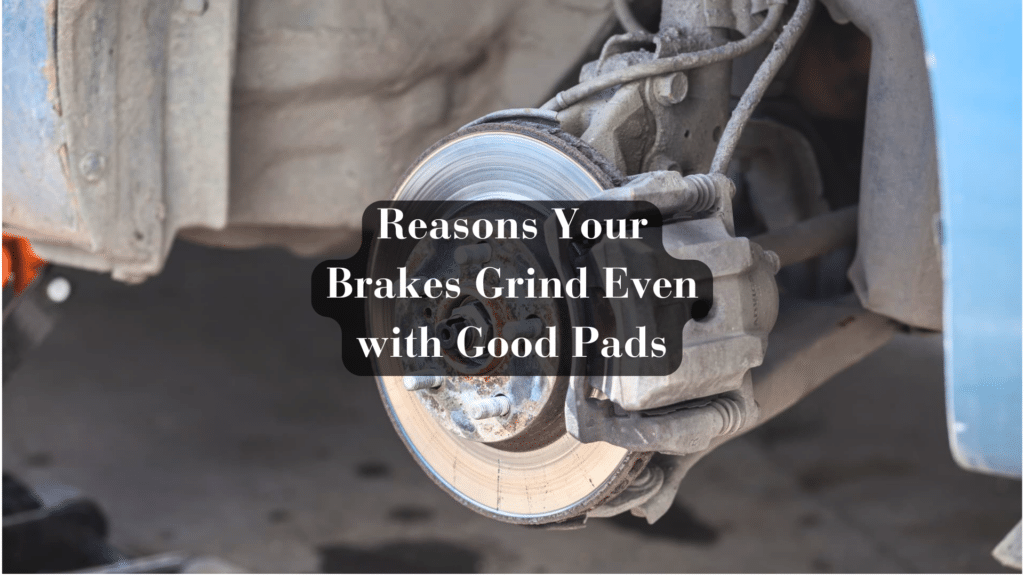Hearing a grinding noise when you hit the brakes? That’s never a good sign.
Most people assume worn-out brake pads are to blame, but that’s not always the case. Your brakes can still grind even if the pads look fine.
This article will explain 15 possible reasons your brakes make that awful sound. We’ll cover common issues like:
- Warped or rusty rotors
- Stuck brake calipers
- Bad wheel bearings
- Debris caught in the system
Grinding brakes means trouble. Ignoring the noise could lead to expensive repairs or even brake failure. That’s why it’s important to figure out the cause early.
I’ll explain each reason in simple terms so you can diagnose the issue and decide what to do next. Let’s get started.
Common Brake System Issues

Not all grinding brakes mean your pads are bad. Your braking system has other parts that can wear out or fail. If something’s off, your brakes can make noise—even if the pads look fine.
Here are some common brake system problems that could be causing the grinding.
1. Warped Rotors
Your brake rotors should be smooth and even. However, they can warp if they get too hot, creating an uneven surface. When this happens, your brake pads don’t press evenly, causing a grinding or pulsing feel.
Unique Features:
- The steering wheel may vibrate when braking.
- The grinding gets worse the harder you brake.
- Warped rotors can wear out pads faster.
2. Rusty or Dirty Rotors
Rotors can collect rust, dirt, or debris, especially if your car sits for a while. A thin layer of rust isn’t a big deal—it wears off after a few stops. But thick rust or dirt buildup can make your brakes grind.
Unique Features:
- Grinding noise mostly happens after the car sits overnight.
- Light rust can go away with normal driving.
- Severe rust might need the rotors resurfaced or replaced.
3. Brake Caliper Problems
Brake calipers push the pads against the rotors when you brake. But if a caliper sticks or fails, it can keep the pads in constant contact with the rotor, creating a grinding or dragging noise.
Unique Features:
- The car may pull to one side when braking.
- Brakes may feel weak or unresponsive.
- Grinding happens even when you’re not pressing the brake.
4. Loose or Broken Brake Hardware
Brakes have small parts, such as clips, pins, and bolts. If any of these come loose, they can rattle or scrape against the rotor, causing a grinding sound.
Unique Features:
- Noise may be inconsistent—sometimes grinding, sometimes rattling.
- Braking performance might not feel different.
- A mechanic can quickly spot loose parts.
If your brakes are making noise and the pads seem fine, one of these issues could be the culprit. Next, look at other causes outside of the brake system.
Other Mechanical Causes
Not all grinding noises come from your brakes. Some other parts near your wheels can cause similar sounds. If your brake pads and rotors look fine, one of these issues might be the real problem.
5. Wheel Bearings Gone Bad
Wheel bearings help your wheels spin smoothly. But over time, they can wear out. When that happens, you might hear a grinding noise that sounds like bad brakes. The noise usually gets worse as you drive faster.
Unique Features:
- The grinding changes with speed, not braking.
- You might hear a humming or rumbling sound, too.
- The noise can get louder when turning.
6. CV Joint Problems
Your car’s CV joints connect the transmission to the wheels. They let the wheels move up and down while turning. If they wear out, they can make a grinding or clicking noise near the wheels, especially when turning.
Unique Features:
- Noise happens when turning, not just braking.
- Clicking sounds may get worse over time.
- Bad CV joints can lead to serious drivetrain problems.
7. Stuck Brake Shoes (for Drum Brakes)
If your car has drum brakes in the rear, stuck brake shoes can cause grinding. Brake shoes press against the drum to stop your vehicle. But they can rub against the drum if they get stuck, making a grinding sound.
Unique Features:
- It’s more common in older cars with drum brakes.
- Braking may feel weak or uneven.
- The rear wheels may get hot after driving.
8. Parking Brake Dragging
Your parking brake should be released fully when you start driving. But if the cable gets stuck, the brake may stay slightly engaged. This can cause a grinding noise and even wear down your brake parts faster.
Unique Features:
- The car may feel sluggish like it’s being held back.
- The grinding happens even when you’re not braking.
- The parking brake lever or pedal may feel loose.
If you hear grinding but your brake pads look fine, don’t ignore it. One of these problems could be the cause. Let’s move on to some environmental and driving-related factors that might be at play.
Environmental & Driving Factors
Sometimes, your brakes grind because of things outside your control. Weather, road debris, and driving habits can all play a role. If your pads and rotors seem fine, one of these factors might be the problem.
9. Debris Stuck in Brakes
Brakes sit low, making them easy targets for small rocks, dirt, or road debris. Something lodged between the pad and rotor can create a grinding sound every time you brake.
Unique Features:
- The noise may come and go.
- A high-pitched squeal can happen along with grinding.
- Driving over gravel or dirt roads increases the risk.
10. Excessive Moisture & Rust
Rain, snow, or high humidity can cause a thin layer of rust on your rotors overnight. This is normal and usually goes away after a few stops. But if rust builds up, it can make braking rough and noisy.
Unique Features:
- Grinding mostly happens in the morning or after rain.
- Light rust wears off with normal driving.
- Severe rust can cause pitting on the rotors.
11. Extreme Cold or Heat
Temperature changes affect the metal. In cold weather, brake parts contract and may grind when first used. In hot weather, metal expands, and excessive heat can damage your rotors.
Unique Features:
- The noise may stop once the brakes warm up.
- In extreme heat, brakes may feel spongy.
- Long downhill drives can make grinding worse.
12. Hard Braking Too Often
Slamming on your brakes often can overheat your rotors, causing them to wear unevenly. Heat also causes brake pads to glaze over, reducing their grip and creating a rough surface.
Unique Features:
- Braking may feel less effective over time.
- Grinding gets worse after long drives.
- Overheated rotors can develop cracks.
Your brakes take a beating from everyday conditions. But sometimes, the issue isn’t environmental—the parts themselves. Next, look at other common brake problems that could make that grinding noise.
Miscellaneous Issues
Sometimes, the problem isn’t with your driving or the weather—it’s with the parts themselves. Cheap parts, bad installation, or skipped maintenance can all lead to grinding brakes.
If your brake pads look fine but the noise won’t stop, one of these issues might be the cause.
13. Aftermarket Parts Compatibility
Not all brake parts are made the same. Cheaper aftermarket parts may not fit properly or be made from lower-quality materials. If your new brakes are grinding, the parts might not perfectly match your car.
Unique Features:
- Grinding starts right after a brake job.
- The noise might get worse as the brakes warm up.
- Cheap pads can wear out faster than expected.
14. Improper Brake Installation
Brake pads, rotors, and calipers must be installed correctly to work smoothly. If something is off slightly, it can cause grinding, squealing, or uneven wear. A minor mistake during installation can lead to big problems later.
Unique Features:
- Braking may feel rough or inconsistent.
- You might hear clicking or rattling sounds.
- The problem started right after a brake service.
15. Neglected Brake Maintenance
Brakes need regular care. Ignoring small problems—like low brake fluid, worn-out clips, or dirty components—can lead to grinding noises over time. Routine inspections can catch these issues before they turn into expensive repairs.
Unique Features:
- The grinding has slowly gotten worse.
- Your brake warning light might come on.
- You haven’t had a brake check in a long time.
If your brakes are grinding and the pads look fine, don’t ignore it. Now that you know the possible causes, let’s discuss what you should do next.
What to Do Next?
Grinding brakes are never normal. Ignoring the noise could lead to bigger, more expensive problems—or worse, brake failure. If your brakes are making noise, take action now.
When DIY Cleaning Might Help
Some brake grinding issues are minor and easy to fix. Try these first:
- If you suspect debris, use a hose to rinse your brakes.
- If the rotors have light rust, drive to see if it wears off.
- Check if your parking brake is fully released.
If the grinding goes away, great! But if it keeps coming back, there’s a bigger problem.
When to See a Mechanic
Some brake problems need professional help. Take your car to a mechanic if:
- The grinding gets louder or worse over time.
- You feel vibrations when braking.
- Your vehicle pulls to one side when stopping.
- You notice a burning smell after driving.
A quick brake inspection can save you money in the long run. Please don’t wait until it’s too late. If something feels off, get it checked. Your safety depends on it.
Conclusion
The brakes shouldn’t grind. If they do, something is wrong.
In this article, I covered 15 reasons your brakes might grind even if the pads look fine. From warped rotors to bad wheel bearings, many issues can cause that awful noise.
Now you know what to look for. Some fixes are simple, but others need a mechanic. Either way, don’t ignore it.
Grinding brakes can lead to:
- Expensive repairs
- Unsafe driving conditions
- Total brake failure
Stay ahead of the problem. Regular brake checks can save you money and keep you safe. If you’re unsure, get your brakes inspected. It’s better to fix it now than regret it later.
Frequently Asked Questions
Why Do My Brakes Grind Even When The Pads Are Good?
Brakes can grind due to warped rotors, bad wheel bearings, stuck calipers, or loose brake hardware. Even environmental factors like rust or debris can cause the noise.
Is It Safe To Drive With Grinding Brakes?
No. Grinding brakes means something is wrong. Ignoring it can lead to expensive repairs or brake failure. Get your brakes checked as soon as possible.
Can Dirty Or Rusty Rotors Cause Grinding?
Yes. Rust or dirt buildup on rotors can create a rough surface, causing grinding noises. Light rust wears off with use, but heavy rust may need rotor resurfacing or replacement.

